英语六年级上册重点词汇、句型、语法总复习
- 格式:docx
- 大小:24.02 KB
- 文档页数:10
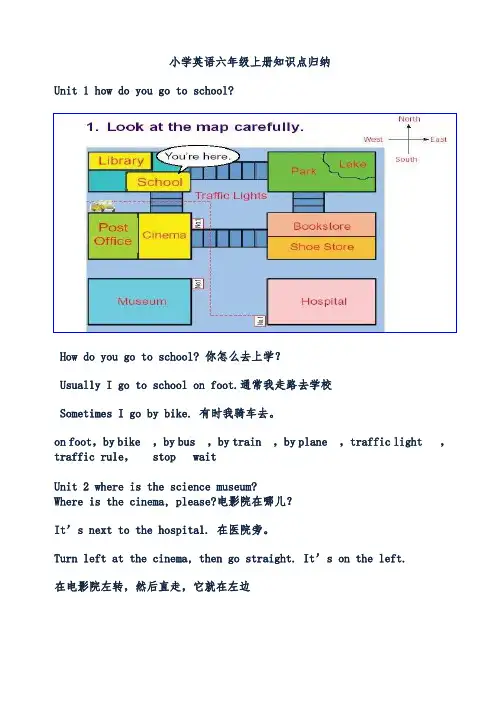
小学英语六年级上册知识点归纳Unit 1 how do you go to school?How do you go to school? 你怎么去上学?Usually I go to school on foot.通常我走路去学校Sometimes I go by bike. 有时我骑车去。
on foot,by bike ,by bus ,by train ,by plane ,traffic light ,traffic rule, stop waitUnit 2 where is the science museum?Where is the cinema, please?电影院在哪儿?It’s next to the hospital. 在医院旁。
Turn left at the cinema, then go straight. It’s on the left.在电影院左转,然后直走,它就在左边library post,office hospital ,cinema , bookstore , next to ,turn right , turn left , go straight , then ,Unit 3 what are you going to do?What are you going to do on the weekend?周末你准备去哪儿?I’m going to visit my grandparents this weekend. 这个周末我要去看望我祖父母。
Where are you going this afternoon?今天下午你去哪儿?I’m going to the bookstore. 我要去书店。
What are you going to buy? 你要去买什么?I am going to buy a comic book..我要去买一本漫画书。
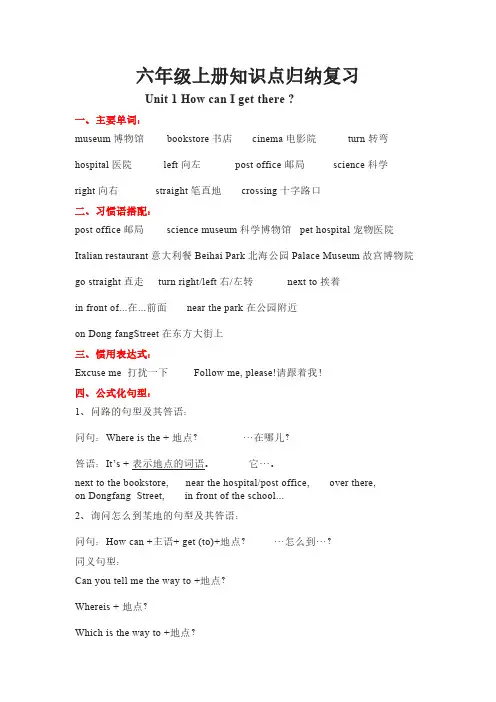
often经常 sometimes 有时候 never 从来不二、习惯语搭配:by bike/bus/plane/subway/train/ship/taxi/ferry骑自行车/乘公共汽车/飞机/地铁/火车/船/出租汽车/渡轮take the No.57 bus乘57路公 on foot步行slow down慢下来pay attention to注意 traffic lights 交通信号灯 look right向右看cross the road横穿马路 get off下车 at home在家 traffic rules交通规则 get to到达 get on 上车 be far from…表示离某地远三、惯用表达式:Wait!等一等! Hooray太好了!I see. 我明白了。
Go at a green light 绿灯行Stop at a red light 红灯停 Wait at a yellow light 黄灯等四、公式化句型:1、如何询问对方的出行方式:How do you come(to)+地点?你(们)怎么来···的?2、如何用must表示必须做某事:某人+must+动词原形(+其它). ···必须···。
3、告诫别人不要做某事的句型:Don’t +动词原形(+其它). .不要/别···。
五、例句:How do you go to school? 你怎么去上学?Usually I go to school on foot. Sometimes I go by bus.通常我步行去上学。
有时候骑自行车去。
How can I get to Zhongshan Park ? 我怎么到达中山公园?You can go by the No. 15 bus. 你可以坐15路公共汽车去。
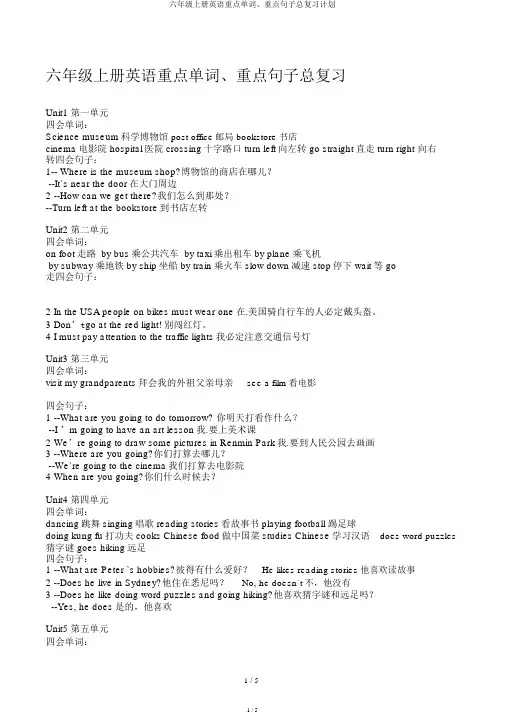
六年级上册英语重点单词、重点句子总复习Unit1 第一单元四会单词:Science museum科学博物馆post office邮局 bookstore书店cinema电影院 hospital医院 crossing十字路口 turn left向左转 go straight直走 turn right 向右转四会句子:1-- Where is the museum shop?博物馆的商店在哪儿?--It`s near the door在大门周边2 --How can we get there?我们怎么到那处?--Turn left at the bookstore到书店左转Unit2 第二单元四会单词:on foot走路 by bus乘公共汽车 by taxi乘出租车 by plane乘飞机by subway乘地铁 by ship坐船 by train乘火车 slow down减速 stop停下 wait等 go走四会句子:2 In the USA people on bikes must wear one在.美国骑自行车的人必定戴头盔。
3 Don’t go at the red light! 别闯红灯。
4 I must pay attention to the traffic lights我必定注意交通信号灯Unit3 第三单元四会单词:visit my grandparents拜会我的外祖父亲母亲see a film看电影四会句子:1 --What are you going to do tomorrow? 你明天打看作什么?--I ’m going to have an art lesson我.要上美术课2 We’re going to draw some pictures in Renmin Park我.要到人民公园去画画3 --Where are you going?你们打算去哪儿?--We`re going to the cinema我们打算去电影院4 When are you going?你们什么时候去?Unit4 第四单元四会单词:dancing跳舞 singing唱歌 reading stories看故事书 playing football 踢足球doing kung fu打功夫 cooks Chinese food做中国菜 studies Chinese学习汉语does word puzzles 猜字谜 goes hiking远足四会句子:1 --What are Peter `s hobbies?彼得有什么爱好?--He likes reading stories他喜欢读故事2 --Does he live in Sydney?他住在悉尼吗?--No, he doesn`t不,他没有3 --Does he like doing word puzzles and going hiking?他喜欢猜字谜和远足吗?--Yes, he does是的,他喜欢Unit5 第五单元四会单词:factory worker工厂工人 postman businessman买卖人police officer 警察 fisherman民 scientist科学家 pilot 行 coach教四会句子:1 --What does he do?他是做什么的?--He is a businessman他.是商人2--Where does he work?他在哪儿工作?-- He works at sea.他在海上工作。
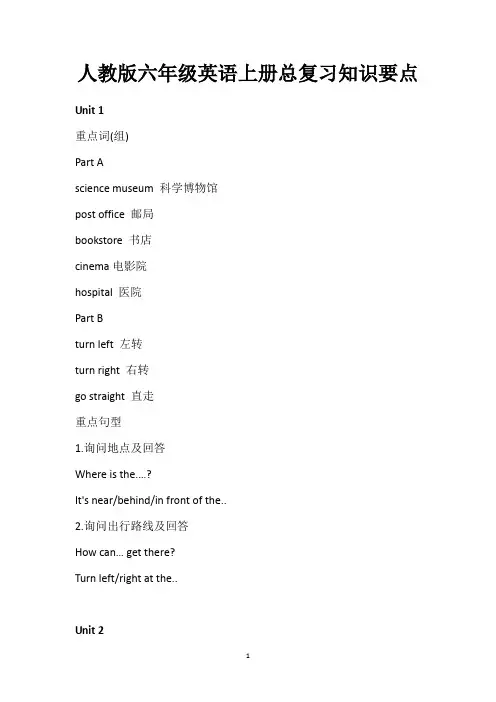
人教版六年级英语上册总复习知识要点Unit 1重点词(组)Part Ascience museum 科学博物馆post office 邮局bookstore 书店cinema电影院hospital 医院Part Bturn left 左转turn right 右转go straight 直走重点句型1.询问地点及回答Where is the.…?It's near/behind/in front of the..2.询问出行路线及回答How can… get there?Turn left/right at the..Unit 2重点词(组)Part Aon foot步行by bus 乘公共汽车by plane 乘飞机by taxi 乘出租车by ship 乘轮船by subway 乘地铁Part Bgo 通行wait 等待stop 停slow down 慢下来重点句型1.询问交通方式及回答How do you come/go to.. ?I usually come/go to…on/by...2.交通规则表达方法Don't go at a red light.Slow down and stop at a yellow light. Go at a green light.Unit 3重点词(组)Part Avisit my grandparents 看望我的(外)祖父母see a film 看电影take a trip 去旅行go to the supermarket 去超市tonight 在今晚tomorrow明天next week 下周Part Bdictionary词典word book 单词书postcard 名信片重点句型1.询问将来某时的计划打算及回答What are you going to do...?I'm going to….We're going to...2.疑问副词在一般将来时里的运用Where are you going?When are you going?How are you going ?Unit 4重点词(组)Part Asing 唱歌dance 跳舞read stories 读故事do Kung Fu练武术Part Bstudy Chinese 学汉语do word puzzles 玩字谜游戏go hiking 去远足cook Chinese food 做中餐重点句型1.询问某人的兴趣爱好及回答What is/are his/her/your hobby/hobbies?He likes.….She likes...I like...2.用一般现在时的一般疑问句询问某人的兴趣爱好及肯定和否定回答Does he/she/Mike like.….?Yes, he/she does. ;No, he/she doesn't.Unit 5重点词(组)Part Afactory worker 工厂工人postman 邮递员businessman 商人police officer 警察Part Bfisherman 渔民scientist 科学家pilot 飞行员coach教练重点句型1.询问某人的职业及回答What does he/she do?He/She is a/an….2.正确运用疑问副词Where does he/she work?He/She works….How does he/she go to work?He/She goes to work...Unit 6重点词(组)Part Aangry生气的afraid 害怕的sad 难过的worried 担心的happy高兴的Part Bdo more exercise多运动wear warm clothes 穿暖和衣服take a deep breath 深深吸一口气count to ten 数到十see a doctor 看医生重点句型1.描述情绪的表达方法He is afraid of...She is angry with...2.对某人提出建议You should... He should... Don't…。
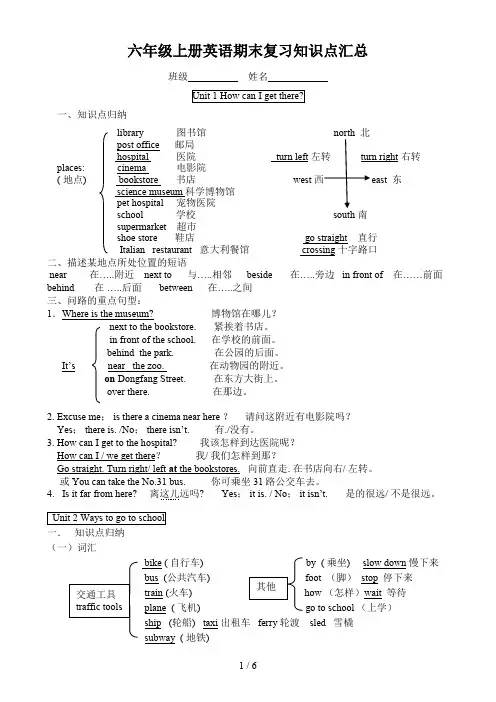
六年级上册英语期末复习知识点汇总班级__________ 姓名____________一、知识点归纳library 图书馆post office 邮局hospital 医院 turn left 右转places: cinema 电影院( 地点) bookstore 书店 westscience museum 科学博物馆pet hospital 宠物医院 school 学校 south 南supermarket 超市shoe store 鞋店 go straight 直行Italian restaurant 意大利餐馆 crossing 十字路口二、描述某地点所处位置的短语near 在…..附近 next to 与…..相邻 beside 在…..旁边 in front of 在……前面 behind 在 …..后面 between 在…..之间三、问路的重点句型:1.Where is the museum? 博物馆在哪儿?next to the bookstore. 紧挨着书店。
in front of the school. 在学校的前面。
behind the park. 在公园的后面。
It’s near the zoo. 在动物园的附近。
on Dongfang Street. 在东方大街上。
over there. 在那边。
2. Excuse me ; is there a cinema near here ? 请问这附近有电影院吗?Yes ; there is. /No ; there isn’t. 有./没有。
3. How can I get to the hospital? 我该怎样到达医院呢?How can I / we get there ? 我/ 我们怎样到那?Go straight. Turn right/ left at the bookstores. 向前直走. 在书店向右/ 左转。
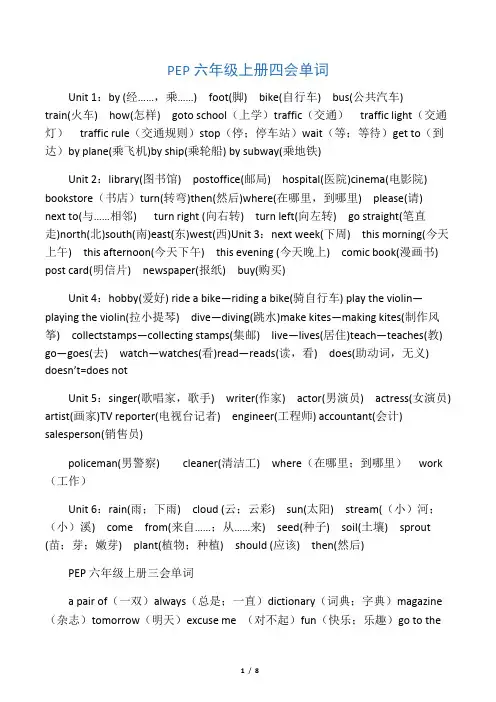
PEP六年级上册四会单词Unit 1:by (经……,乘……) foot(脚) bike(自行车) bus(公共汽车)train(火车) how(怎样) goto school(上学)traffic(交通)traffic light(交通灯)traffic rule(交通规则)stop(停;停车站)wait(等;等待)get to(到达)by plane(乘飞机)by ship(乘轮船) by subway(乘地铁)Unit 2:library(图书馆) postoffice(邮局) hospital(医院)cinema(电影院) bookstore(书店)turn(转弯)then(然后)where(在哪里,到哪里) please(请) next to(与……相邻) turn right (向右转) turn left(向左转) go straight(笔直走)north(北)south(南)east(东)west(西)Unit 3:next week(下周) this morning(今天上午) this afternoon(今天下午) this evening (今天晚上) comic book(漫画书) post card(明信片) newspaper(报纸) buy(购买)Unit 4:hobby(爱好) ride a bike—riding a bike(骑自行车) play the violin—playing the violin(拉小提琴) dive—diving(跳水)make kites—making kites(制作风筝) collectstamps—collecting stamps(集邮) live—lives(居住)teach—teaches(教) go—goes(去) watch—watches(看)read—reads(读,看) does(助动词,无义) doesn’t=does notUnit 5:singer(歌唱家,歌手) writer(作家) actor(男演员) actress(女演员) artist(画家)TV reporter(电视台记者) engineer(工程师) accountant(会计) salesperson(销售员)policeman(男警察) cleaner(清洁工) where(在哪里;到哪里)work (工作)Unit 6:rain(雨;下雨) cloud (云;云彩) sun(太阳) stream((小)河;(小)溪) come from(来自……;从……来) seed(种子) soil(土壤) sprout (苗;芽;嫩芽) plant(植物;种植) should (应该) then(然后)PEP六年级上册三会单词a pair of(一双)always(总是;一直)dictionary(词典;字典)magazine (杂志)tomorrow(明天)excuse me (对不起)fun(快乐;乐趣)go to thecinema(去看电影)look(看上去)month(月份;月)read a magazine(阅读杂志)science museum(科学博物馆)shoe store(鞋店)show(展览;演出;表演;节目)take(乘坐)take a trip(去旅行)tell(告诉)tonight(今晚)vapour(蒸汽;水汽)want(想要)with(同……;和……)know(知道)minute (分钟)again(再一次;又;再)PEP六年级上册四会句型Unit 1How do you go to school, Sarah?Usually I go to school on foot.Sometimes I go by bike.How can I get to Zhongshan Park?You can go by the No.15 bus.Unit 2Whe re is the cinema, please?It’s next to the hospital.Turn left at the cinema, then go straight.It’s on the left.Unit 3What are you going to do on the weekend?I’m going to visit my grandparents this weekend.Where are you going this afternoon?I’m going to the bookstore.What are you going to buy?I am going to buy a comic book.Unit 4What’s your hobby?I like collecting stamps.He likes collecting stamps, too.Does she teach English?No, she doesn’t.Does she teach you math?Yes, she does.Unit 5What does your mother do?She is a TV reporter.Where does she work?She works in a school.How does she go to work?She goes to work by bus.Unit 6Where does the rain come from?It comes from the clouds. How do you do that?What should you do then?PEP六年级上册三会句型1.My home is near.2.What about you?3.Look at the traffic lights.4.Remember the traffic rules.5.Stop at a red light.6.Wait at a yellow light.7.Go at a green light.8.Can I go on foot? Sure, if you like.It’s not far.9.Where is the …? It’s near the …10.Excuse me, is there a … near here? Yes, thereis.11.Is it far from here? No, it’s not far.12.–Thank you.–You’re welcome.13.Where is the …?It’s east/west/south/north of the …14.When are you going? I am going at 3 o’clock.15.Can he go with us? Sure.16.Let’s go together.17.There is a stamp show on Sunday.18.She is a teacher. She teaches math.19.Does your pen pal live in Shanghai?No, he doesn’t. He lives in Beijing.20.Where does she work? She works in a car company.21.How does she go to work? She goes to work by bus.22.Where does the … come from? It comes from the …23.How can the water become vapour?The sun shines and the water becomes vapour.24.How do you do that?First, put the seeds in the soil.25.It’s easy.26.What should you do then?Water them. In several days, you can see a sprout.27.First, …Then, …Next, …At last, …语法复习一、现在进行时态(3种变化规律)1.直接加ing:do—doing draw—drawing cook—cooking answer—answering read—reading listen—listening fly—flying sing—singing play—playing2.去掉末尾的e加ing:write—writing dance—dancing take—taking have—having make—making ride—riding dive—diving3.双写末尾字母加ing:get—getting run—running swim—swimming sit—sitting put—putting你正在干什么?What are you doing? I’m answering the phone.他/她/它正在干什么?What is he/she/it doing?He’s/She’s/It’s …他(她、它)们正在干什么?What are they doing?They are …看到like或likes后面的动词要加上ing二、一般将来时态(be going to/will +动词原形)表示一般将来时的时间状语有:this morning,this afternoon,this evening,tomorrow,tonight, this weekend, on the weekend, next week, next month, next year, next weekend.(今晚)你将要做什么?What are you going to do (this evening)?I’m going to the cinema.I’m going to visit my grandparents.你将什么时候去?When are you going?I’m going at 7:10.你将怎样去呢?How are you going?I’m going by bus.今天下午你将要去哪里?Where are you going this afternoon?I’m going to the bookstore.你将要买什么呢?What are you going to buy?I’m going to buy a comic book.你将和谁一起去?Who are you going with?I’m going with my parents.三、第三人称单数后面的动词要加s或es1.一般情况加s,如:read—reads;live—lives;play—plays;sing—sings2.动词末尾以s,x,ch,sh或部分以o结尾的加es。
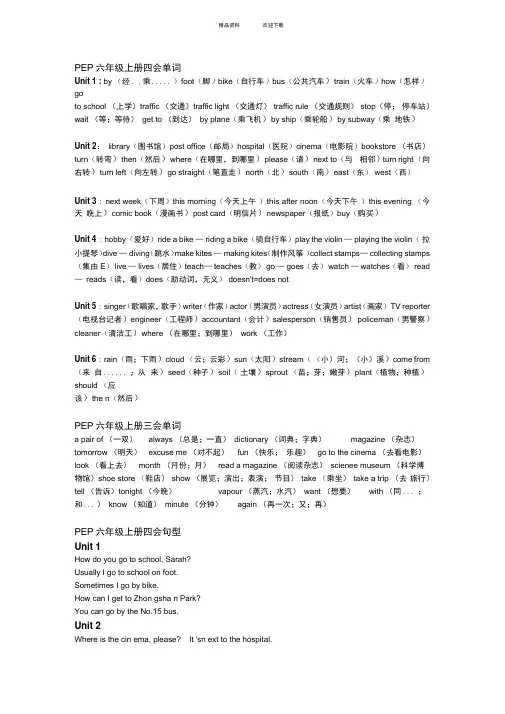
PEP六年级上册四会单词Unit 1 : by (经. ,乘..... )foot(脚)bike(自行车)bus(公共汽车)train(火车)how(怎样)goto school (上学)traffic (交通)traffic light (交通灯)traffic rule (交通规则)stop(停;停车站)wait (等;等待)get to (到达)by plane(乘飞机)by ship(乘轮船)by subway(乘地铁)Unit 2:library(图书馆)post office(邮局)hospital(医院)cinema(电影院)bookstore (书店)turn(转弯)then(然后)where(在哪里,到哪里)please(请)next to(与相邻)turn right (向右转)turn left(向左转)go straight(笔直走)north(北)south(南)east(东) west(西)Unit 3 : next week(下周)this morning(今天上午)this after noon(今天下午)this evening (今天晚上)comic book(漫画书)post card(明信片)newspaper(报纸)buy(购买)Unit 4 : hobby(爱好)ride a bike —riding a bike(骑自行车)play the violin —playing the violin(拉小提琴)dive —diving(跳水)make kites —making kites(制作风筝)collect stamps—collecting stamps (集由E) live —lives(居住)teach—teaches(教) go —goes(去) watch —watches(看) read —reads(读,看)does(助动词,无义) doesn't=does notUnit 5 : singer(歌唱家,歌手)writer(作家)actor(男演员)actress(女演员)artist(画家) TV reporter (电视台记者)engineer(工程师)accountant(会计)salesperson(销售员) policeman(男警察)cleaner(清洁工)where (在哪里;到哪里)work (工作)Unit 6 : rain(雨;下雨)cloud (云;云彩)sun(太阳)stream((小)河;(小)溪)come from (来自...... ;从来)seed(种子)soil(土壤)sprout (苗;芽;嫩芽)plant(植物;种植)should (应该)the n(然后)PEP六年级上册三会单词a pair of (一双)always (总是;一直)dictionary (词典;字典)magazine (杂志)tomorrow (明天)excuse me (对不起)fun (快乐;乐趣)go to the cinema (去看电影)look (看上去)month (月份;月)read a magazine (阅读杂志)scienee museum (科学博物馆)shoe store (鞋店)show (展览;演出;表演;节目)take (乘坐)take a trip (去旅行)tell (告诉)tonight (今晚)vapour (蒸汽;水汽)want (想要)with (同... ;和... )know (知道)minute (分钟)again (再一次;又;再)PEP六年级上册四会句型Unit 1How do you go to school, Sarah?Usually I go to school on foot.Sometimes I go by bike.How can I get to Zhon gsha n Park?You can go by the No.15 bus.Unit 2Where is the cin ema, please? It 'sn ext to the hospital.Turn left at the cin ema, the n go straight. It' on the left.Unit 3What are you going to do on the weeke nd?I'm going to visit my gran dpare nts this weeke nd.Where are you going this after noon? I'm going to the bookstore. What are you going to buy? I am going to buy a comic book.Unit 4What 'your hobby? I like collecting stamps.He likes collect ing stamps, too.Does she teach En glish? No, she does n't.Does she teach you math? Yes, she does.Unit 5What does your mother do? She is a TV reporter.Where does she work? She works in a school.How does she go to work? She goes to work by bus.Unit 6Where does the rain come from? It comes from the clouds.How do you do that?What should you do the n?PEP六年级上册三会句型1. My home is n ear.2. What about you?3. Look at the traffic lights.4. Remember the traffic rules.5. Stop at a red light.6. Wait at a yellow light.7. Go at a gree n light.8. Can I go on foot? Sure, if you like. It ' s not far.9. Where is the …? It ' s near the …10. Excuse me, is there a … near here? Yes, there is.11. Is it far from here? No, it ' s not far.12. -Thank you. - You' re welcome.13. Where is the …?It ' s east/west/south/north of the …14. When are you going? I am going at 3 o 'ock.15. Can he go with us? Sure.16. Let ' s go together.17. There is a stamp show on Sun day.18. She is a teacher. She teaches math.19. Does your pen pal live in Shanghai?No, he doesn ' t. He lives in Beijing.20. Where does she work? She works in a car company.21. How does she go to work? She goes to work by bus.22. Where does the … come from? It comes from the23. How can the water become vapour?The sun shines and the water becomes vapour.24. How do you do that?First, put the seeds in the soil.25. It ' s easy.26. What should you do then?Water them .In several days, you can see a sprout.27. First, …Then,…Next, …At last, …语法复习一、现在进行时态(3种变化规律)1. 直接力口ing : do—doing draw —drawing cook —cooking answer—answeringread—readi ng liste n —liste ning fly —flying sing —singing play—play ing 2. 去掉末尾的e 力口ing : write —writingdance—dancing take—taking have—havingmake—making ride—ridi ng dive ——divi ng3. 双写末尾字母力口ing : get—getting run—running swim —swimming sit—sittingput—putt ing你正在干什么?What are you doing? I'm an sweri ng the pho ne.他/她/它正在干什么?What is he/she/it doing? He's/She's/lt s …他(她、它)们正在干什么?What are they doi ng? They are…看到like或likes后面的动词要加上ing二、一般将来时态(be going to/will +动词原形)表示一般将来时的时间状语有:this morning, this afternoon, this evening, tomorrow, tonight, this weekend, on the weekend, next week, next month, next year, next weekend.(今晚)你将要做什么?What are you goi ng to do (this evenin g)?I'm going to the cin ema.I'm going to visit my gra ndpare nts.你将什么时候去?When are you goin g?I'm goi ng at 7:10.你将怎样去呢?How are you goin g?I'm going by bus.今天下午你将要去哪里?Where are you goi ng this afternoo n?I'm going to the bookstore.你将要买什么呢?What are you goi ng to buy?I'm going to buy a comic book.你将和谁一起去?Who are you goi ng with?I m going with my parents.三、第三人称单数后面的动词要加s或es1. 一般情况力口s, 如:read—reads; live —lives; play —plays; sing—sings2. 动词末尾以s, x, ch, sh或部分以o结尾的加es。
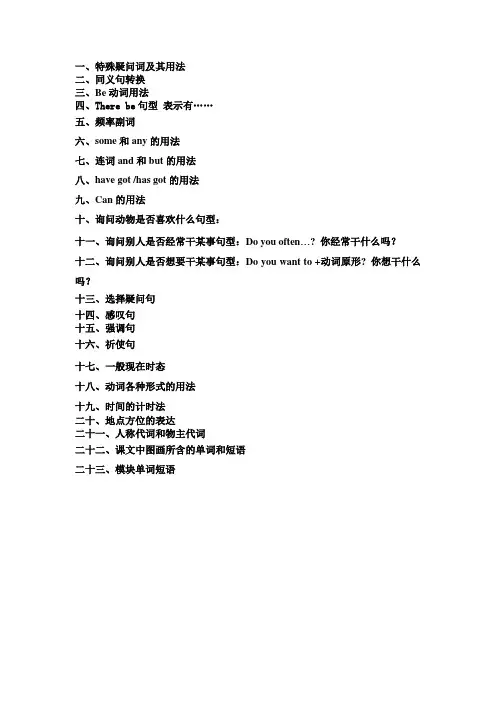
一、特殊疑问词及其用法二、同义句转换三、Be动词用法四、There be句型表示有……五、频率副词六、some和any的用法七、连词and和but的用法八、have got /has got的用法九、Can的用法十、询问动物是否喜欢什么句型:十一、询问别人是否经常干某事句型:Do you often…? 你经常干什么吗?十二、询问别人是否想要干某事句型:Do you want to +动词原形? 你想干什么吗?十三、选择疑问句十四、感叹句十五、强调句十六、祈使句十七、一般现在时态十八、动词各种形式的用法十九、时间的计时法二十、地点方位的表达二十一、人称代词和物主代词二十二、课文中图画所含的单词和短语二十三、模块单词短语一、特殊疑问词及其用法1. How long 问,长度(metre/kilometre)答How long is the Great Wall? It’s about six thousand seven hundred kilometers.2. How big 问,人口(people)答How big is Beijing? Beijing’s got about fourteen million people .3.How many 问,数字+名词复数答。
How many countries are in the UN? 191 countries are in the UN.4. Where问,地点/方向答Where’s New York? It’s in the east of America.5.When 问,时间答When is the UN building open? The UN building is open at 9:45.6.What time 问,钟点答。
What time is it? It’s ten to five.7. What…doing 问,动词ing答What are you doing ? I’m sending an email.8. What(is…的hobby)问,爱好答What is your hobby? Collecting stamps is my hobby./I like collecting stamps.9. What…do问,动词(事情)答。
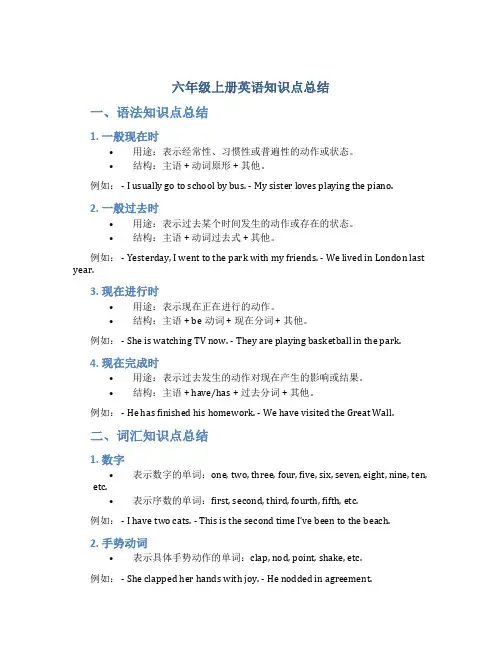
六年级上册英语知识点总结一、语法知识点总结1. 一般现在时•用途:表示经常性、习惯性或普遍性的动作或状态。
•结构:主语 + 动词原形 + 其他。
例如: - I usually go to school by bus. - My sister loves playing the piano.2. 一般过去时•用途:表示过去某个时间发生的动作或存在的状态。
•结构:主语 + 动词过去式 + 其他。
例如: - Yesterday, I went to the park with my friends. - We lived in London last year.3. 现在进行时•用途:表示现在正在进行的动作。
•结构:主语 + be动词 + 现在分词 + 其他。
例如: - She is watching TV now. - They are playing basketball in the park.4. 现在完成时•用途:表示过去发生的动作对现在产生的影响或结果。
•结构:主语 + have/has + 过去分词 + 其他。
例如: - He has finished his homework. - We have visited the Great Wall.二、词汇知识点总结1. 数字•表示数字的单词:one, two, three, four, five, six, seven, eight, nine, ten, etc.•表示序数的单词:first, second, third, fourth, fifth, etc.例如: - I have two cats. - This is the second time I’ve been to the beach.2. 手势动词•表示具体手势动作的单词:clap, nod, point, shake, etc.例如: - She clapped her hands with joy. - He nodded in agreement.3. 学科单词•表示不同学科的单词:math, English, science, history, etc.例如: - I enjoy studying English. - She is good at math.三、句型知识点总结1. 祈使句•用途:表达请求、命令、建议等。
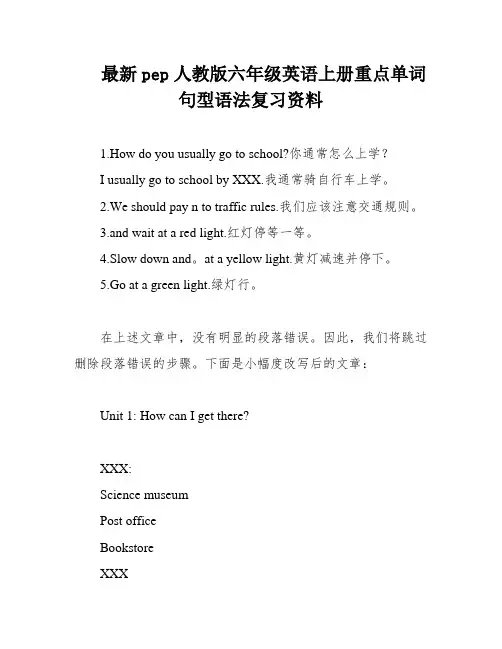
最新pep人教版六年级英语上册重点单词句型语法复习资料1.How do you usually go to school?你通常怎么上学?I usually go to school by XXX.我通常骑自行车上学。
2.We should pay n to traffic rules.我们应该注意交通规则。
3.and wait at a red light.红灯停等一等。
4.Slow down and。
at a yellow light.黄灯减速并停下。
5.Go at a green light.绿灯行。
在上述文章中,没有明显的段落错误。
因此,我们将跳过删除段落错误的步骤。
下面是小幅度改写后的文章:Unit 1: How can I get there?XXX:Science museumPost officeBookstoreXXXHospitalCrossingXXX leftXXX rightGo straightMapCompassGPSStarsXXXGet toKey Phrases:1.Where is the restaurant?It's next to the XXX.2.How can we get there?Turn left at the bookstore。
Then turn right at the hospital.3.He now has GPS.4.What an interesting film!ns:Next toNearXXXXXXIn front ofUnit 2: Ways to go to schoolXXX:On footBy XXXBy busBy trainXXXBy shipBy XXXSlow downTraffic lightsTraffic rulesGo/come to schoolBy sledBy XXXPay n toand wait at a red lightSlow down and。
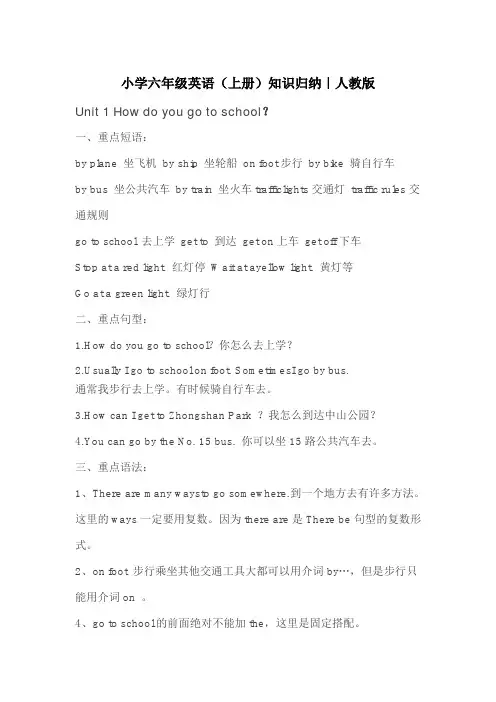
小学六年级英语(上册)知识归纳|人教版Unit 1 How do you go to school?一、重点短语:by plane 坐飞机by ship 坐轮船on foot步行by bike 骑自行车by bus 坐公共汽车by train 坐火车trafficlights交通灯traffic rules交通规则go to school 去上学get to 到达get on上车get off下车Stop at a red light. 红灯停Wait at ayellow light. 黄灯等Go at a green light. 绿灯行二、重点句型:1.How do you go to school?你怎么去上学?ually I go to school on foot. SometimesI go by bus.通常我步行去上学。
有时候骑自行车去。
3.How can I get to Zhongshan Park ?我怎么到达中山公园?4.You can go by the No. 15 bus. 你可以坐15路公共汽车去。
三、重点语法:1、There are many waysto go somewhere.到一个地方去有许多方法。
这里的ways一定要用复数。
因为there are是There be句型的复数形式。
2、on foot 步行乘坐其他交通工具大都可以用介词by…,但是步行只能用介词on 。
4、go to school的前面绝对不能加the,这里是固定搭配。
5、USA 和US 都是美国的意思。
另外America也是美国的意思。
6、go to the park 前面一定要加the. 如果要去的地方有具体的名字,就不能再加the ,如果要去的地方没有具体名字,都要在前面加the. (go to school除外。
)7、How do you go to …?你怎样到达某个地方?如果要问的是第三人称单数,则要用:How does he/she…go to …?8、反义词:get on(上车)---get off(下车)near(近的)—far(远的)fast(快的)—slow(慢的)because(因为)—why(为什么)same(相同的)—different(不同的)9、近义词:see you---goodbye sure---certainly---ofcourse10、频度副词:always 总是,一直usually 通常often经常sometimes 有时候never 从来不Unit 2 Where is the science museum?一、重点短语:library 图书馆post office 邮局hospital医院cinema 电影院bookstore书店science museum科学博物馆turnleft向左转turn right 向右转go straight 直行north北south南east东west西next to靠近、与……。
六年级上册英语重点单词重点句子总复习六年级上册英语重点单词重点句子总复习Revised final draft November 26, 2020PEP六年级上册四会单词及句子复习Unit1第一单元四会单词:Sciencemuseum科学博物馆postoffice邮局bookstore书店cinema电影院hospital医院crossing十字路口turnleft向左转gostraight直走turnright向右转四会句子:1--Whereisthemuseumshop博物馆的商店在哪儿--It`snearthedoor在大门附近2--Howcanwegetthere我们怎么到那儿--Turnleftatthebookstore到书店左转Unit2第二单元四会单词:onfoot走路bybus乘公共汽车bytaxi乘出租车byplane乘飞机bysubway乘地铁byship乘船bytrain乘火车slowdown减速stop停下wait等go走四会句子:1--Howdoyoucometoschool你怎么来学校的--Usually,Icomeonfoot通常我走路来2IntheUSApeopleonbikesmustwearone.在美国骑自行车的人必须戴头盔。
3?Don’tgoattheredlight!别闯红灯。
4Imustpayattentiontothetrafficlights我必须注意交通信号灯Unit3第三单元?四会单词:visitmygrandparents拜访我的外祖父母seeafilm看电影takeatrip远行gotothesupermarket去超市dictionary词典comicbook连环画书wordbook单词书postcard明信片四会句子:1--Whatareyougoingtodotomorrow你明天打算做什么--I’mgoingtohaveanartlesson.我要上美术课2?We’regoingtodrawsomepicturesinRenminPark.我要到人民公园去画画3--Whereareyougoing你们打算去哪儿--We`regoingtothecinema我们打算去电影院4Whenareyougoing你们什么时候去Unit4第四单元四会单词:dancing跳舞singing唱歌readingstories看故事书playingfootball踢足球doingkungfu打功夫cooksChinesefood做中国菜studiesChinese学习汉语doeswordpuzzles猜字谜goeshiking远足四会句子:1--WhatarePeter`shobbies彼得有什么爱好--Helikesreadingstories他喜欢读故事2--DoesheliveinSydney他住在悉尼吗--No,hedoesn`t不,他没有3--Doeshelikedoingwordpuzzlesandgoinghiking他喜欢猜字谜和远足吗--Yes,hedoes是的,他喜欢Unit5第五单元?四会单词:factoryworker工厂工人postman邮递员businessman生意人policeofficer警察fisherman渔民scientist科学家pilot飞行员coach教练四会句子:1--Whatdoeshedo他是做什么的--Heisabusinessman.他是商人2--Wheredoeshework他在哪儿工作--Heworksatsea.他在海上工作。
六年级英语上册知识点复习汇总(PEP)小学英语总复习六年级上册知识点Unit 1 How can I get there ?一、主要单词:museum博物馆bookstore书店cinema电影院turn 转弯hospital医院left向左post office 邮局science科学right向右straight笔直地 crossing十字路口二、习惯语搭配:post office邮局 science museum科学博物馆pet hospital宠物医院 Italian restaurant意大利餐馆Beihai Park 北海公园Palace Museum故宫博物院go straight直走turn right/left右/左转next to挨着in front of...在...前面near the park在公园附近on Dongfang Street在东方大街上三、惯用表达式:Excuse me 打扰一下 Follow me, please!请跟着我!四、公式化句型:1、问路的句型及其答语:问句:Where is the + 地点?······在哪儿?答语:It's + 表示地点的词语(next to the bookstore, near the hospital/post office, over there,on Dongfang Street, in front of the school... )2、询问怎么到某地的句型及其答语:问句:How can +主语 + get (to)+地点?·····怎么到·····?同义句型: Can you tell me the way to +地点?Where is + 地点? Which is the way to +地点?五、例句:Where is the cinema, please? 请问电影院在哪里?It's next to the hospital. 它与医院相邻。
湘少版六年级上册英语复习重点(精修版)Unit 1 What did you do during the holidays?During the holidays。
we have a lot of free time to do different things。
Some people like to travel to different places。
while others prefer to stay at home and relax。
I did a lot of different XXX.Firstly。
XXX。
We had a lot of fun together.Secondly。
I learned how to write better。
I practiced writing different types of texts。
XXX I think my writing has improved a lot.Finally。
XXX。
It was a great way to XXX.Overall。
I had a great time during my holidays。
I learned a lot and had fun with my friends.Grammar: Past Simple XXXXXX indicate past time。
like yesterday。
last week。
or two days ago.To form the past simple tense。
we add -ed to regular verbs。
like worked or looked。
If the verb ends in -e。
we just add -d。
like in the word lived。
If the verb ends in a consonant + y。
英语六年级上册重点词汇、句型、语法总复习 Unit 1 要求会写,英汉互译。 课内掌握: (科学博物馆) library( ) post office( ) (医院) cinema( ) ( 书店 ) turn( )
( 然后 ) how( ) get to( ) (哪里) please( ) next to( ) ( 向右转 ) ( 向左转 ) (直走) 课外了解:north( 北方 ) south( 南方 ) east( 东方 ) west( 西方 ) Unit 2 课内掌握:on foot( ) (乘) bike( ) (公交车) taxi ( ) (火车 ) sled( ) (轮渡) go to school( ) (交通) traffic lights( ) ( 停) slow( ) (慢下来) wait( ) (乘飞机) by ship ( ) (乘地铁) 课外了解:traffic rules(交通规则) Unit 3 课内掌握: see a film( ) (去旅行) this morning( ) (今天下午) this evening ( ) (在今晚) tomorrow ( ) (下周) comic book( ) (明信片) newspaper( ) (词典) 课外了解:magazine(杂志) read a magazine(阅读杂志) Unit 4 课内掌握:pen pal( ) (爱好) do word puzzles—doing word puzzles ( ) go hiking— going hiking( ) (表示征求意见) share( ) 课外了解:ride a bike—riding a bike(骑自行车) play the violin—playing the violin(拉小提琴) collect stamps—collecting stamps (集邮) Unit 5 课内掌握:factory worker( ) (邮递员)busniessman( ) (警察) fisherman( ) (科学家)pilot( ) (教练) head teacher( ) (电视台记着) live—lives( ) —goes(走) read—reads( ) does(否定形式) 课外了解:singer(歌手)writer(记者) actor(演员) actress(女演员) artist(艺术家) engineer(工程师) policeman(警察) cleaner(清洁工) teach—teaches(教) watch—watches(看) Unit 6 课内掌握:angry ( ) (害怕) sad ( ) (担心的) happy ( ) (看病) take a deep breath ( ) (数到十) ill ( ) (应该) well ( ) (担心) 课外了解: fun (有趣的)
答案 Unit 1 要求会写,英汉互译。 课内掌握: science museum(科学博物馆) library(图书馆) post office(邮局) hospital(医院) cinema(电影院) bookstore( 书店 ) turn( 转弯 ) then( 然后 ) how( 怎么样 ) get to(到达) where(哪里) please( 请 ) next to( 挨着 ) turn right ( 向右转 ) turn left( 向左转 ) go straight(直走) 课外了解:north( 北方 ) south( 南方 ) east( 东方 ) west( 西方 ) Unit 2 课内掌握:on foot(步行 ) by(乘) bike(自行车) bus(公交车) taxi (出租车) train(火车 ) sled( 雪橇)ferry(轮渡) go to school(去上学) traffic(交通) traffic lights(交通信号灯) stop( 停)slow(慢的) slow down(慢下来) wait(等待) by plane(乘飞机) by ship (乘轮船) by subway(乘地铁) 课外了解:traffic rules(交通规则) Unit 3 课内掌握:see a film(看电影) take a trip (去旅行) this morning(今天早晨) this afternoon(今天下午) this evening (今天晚上) tonight(在今晚) tomorrow (明天) next week(下周) comic book(连环画册) postcard(明信片) newspaper(报纸) dictionary( 词典) 课外了解:magazine(杂志) read a magazine(阅读杂志) Unit 4 课内掌握:pen pal(笔友) hobby(爱好) do word puzzles—doing word puzzles (猜字谜) go hiking— going hiking(远足) shall(表示征求意见) share( 分享) 课外了解:ride a bike—riding a bike(骑自行车) play the violin—playing the violin(拉小提琴) collect stamps—collecting stamps (集邮) Unit 5 课内掌握:factory worker(工人) postman(邮递员)busniessman(商人) police officer(警察) fisherman(渔民) scientist(科学家)pilot(飞行员) coach(教练) head teacher(校长) TV reporter(电视台记着) live—lives(居住) go—goes(走) read—reads(读) does(否定形式) doesn’t=does not 课外了解:singer(歌手)writer(记者) actor(演员) actress(女演员) artist(艺术家) engineer(工程师) policeman(警察) cleaner(清洁工) teach—teaches(教) watch—watches(看) Unit 6 课内掌握:angry (生气的 ) afraid (害怕) sad (难过的) worried (担心的) happy (高兴的) see a doctor (看病) take a deep breath (深深吸一口气) count to ten (数到十) ill ( 有病) should (应该) well (身体好) worry (担心) 课外了解: fun (有趣的)
重点句型 要求会背,英汉互译。 Unit 1 Where is the museum shop? 在大门附近。 How can we get there ? 到书店左转。 Unit 2 How do you come to school, Sarah? 通常我走路来。 In the USA people on bikes must wear one. 别闯红灯! 我必须注意交通信号灯! Unit 3 What are you going to do tomorrow? 我要上美术课。 I’m going to draw some pictures in Renmin Park. 你们打算去哪儿? We’re going to the cinema. 你们什么时候去? Unit 4 What are Peter's hobbies? 他喜欢读故事。 Does he live in Sydney? 不,他没有。 Does he like doing word puzzles and going hiking? 是的,他喜欢。 Unit 5 What does he do? 他是商人。 Where does he work? 他在海上工作。 How does he go to work? 他骑自行车车去上班。 Unit 6 They're afraid of him. 这只猫很生他们的气。 What's wrong? 你爸爸病了。 He should see a doctor this morning. 别伤心。 Don't worry. 答案 重点句型 要求会背,英汉互译。 Unit 1 Where is the museum shop? 博物馆的商店在哪儿? It’s near the door. 在大门附近。 How can we get there ? 我们怎么到那儿? Turn left at the bookstore. 到书店左转。 Unit 2 How do you come to school, Sarah? 你怎么来学校的? Usually ,I come on foot. 通常我走路来。 In the USA people on bikes must wear one.在美国骑自行车的人必须戴(头盔)。 Don't go at the red light! 别闯红灯! I must pay attention to the traffic lights! 我必须注意交通信号灯! Unit 3 What are you going to do tomorrow? 你明天打算做什么? I’m going to have an art lesson. 我要上美术课。 I’m going to draw some pictures in Renmin Park. 我们要到人民公园去画画。 Where are you going ? 你们打算去哪儿? We’re going to the cinema. 我们打算去电影院。 When are you going ? 你们什么时候去? Unit 4 What are Peter's hobbies? 彼得的爱好是什么? He likes reading stories. 他喜欢读故事。 Does he live in Sydney? 他住在悉尼吗? No, he doesn’t. 不,他没有。 Does he like doing word puzzles and going hiking? 他喜欢猜字谜和远足吗? Yes, he does. 是的,他喜欢。 Unit 5